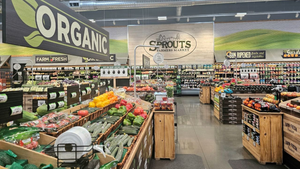Kroger, Walmart, others used pandemic-era disruptions to increase profits, FTC claims in reportKroger, Walmart, others used pandemic-era disruptions to increase profits, FTC claims in report
National Grocers Association applauds report, claiming “power buyers” abused their economic power in the market

The Federal Trade Commission released a scathing report Thursday accusing big grocery players of using pandemic-era supply chain disruptions “as an opportunity to further raise prices and increase their profits, which remain elevated today.”
The report also shows how the supply chain disruptions impacted competition among retailers, wholesalers, producers, consumers, and related businesses. Consumers were hit hard with “skyrocketing prices for groceries” and shortages on products like toilet paper.
“As the pandemic illustrated, a major shock to the supply chain can have cascading effects on consumers, including the prices they pay for groceries,” said FTC Chair Lina M. Khan in a statement. “The FTC’s report examining U.S. grocery supply chains finds that dominant firms used this moment to come out ahead at the expense of their competitors and the communities they serve.”
The report added that some grocers used rising costs, which remain elevated, to increase profits. The FTC investigation focused on nine major retailers and CPG companies, including Walmart, Amazon, Kroger, C&S Wholesale Grocers, Associated Wholesale Grocers, McLane Co., Procter & Gamble, Tyson Foods, and Kraft Heinz.
The report was lauded by the National Grocers Association (NGA) on Friday, noting that the study “confirms what independent grocers and their customers experience firsthand: dominant national chains or so-called ‘power buyers’ are abusing their immense economic power to the detriment of competition and American consumers.”
“In communities nationwide, independent grocers strive to compete on price, quality, service, convenience, and product range,” NGA President and CEO Greg Ferrara said in a statement. “However, decades of lax antitrust enforcement enable grocery power buyers to coercively squeeze suppliers to comply with their trade demands, unfairly disadvantaging smaller competitors.
“The result — confirmed by the FTC’s study — is a less efficient consumer supply chain where buyer power dictates priority distribution of high-demand products and special pricing arrangements.”
The FTC report said smaller retailers, particularly smaller grocers, were disproportionately impacted by supply chain issues compared to larger companies.
“The pandemic also prompted some larger firms to consider buying manufacturing suppliers, which potentially threatens to make certain supply chains even more concentrated in the future,” the FTC said in a statement. “Taken together, the report’s findings reveal how supply chain bottlenecks can leave markets exposed to major supply chain shocks — and that those shocks, in turn, can allow major firms to entrench their dominance.”
The report comes on the heels of an antitrust lawsuit filed by the FTC joined by nine states in late February to block the $24.6 billion Kroger, Albertsons merger. The FTC claims the deal would “eliminate fierce competition between Kroger and Albertsons, leading to higher prices for groceries and other essential household items for millions of Americans.”
The report found that food and beverage retailers increased their revenue by more than 6% over their total costs in 2021, and in the first three quarters of 2023, retailer revenue climbed further to 7% “casting doubt on the assertions of some companies that rising prices at the grocery store are the result of retailers’ own rising costs.”
The FTC also claims that some companies, mainly larger ones, imposed strict delivery requirements and threatened fines for failure to deliver, which pressured suppliers to prioritize them over smaller competitors.
Some retailers also engaged in “excessive consolidation” particularly with private label products “as firms recognized the risks associated with having few suppliers available.”
“Some firms buying goods in markets with few suppliers even began exploring whether to build or acquire manufacturing capacity to reduce their exposure to concentrated markets,” the FTC said. “The report warns, however, that moves by larger customers to buy one of the few remaining market participants rather than building that capability from scratch could leave the remaining buyers, notably smaller competing firms, even worse off.”
Chris Jones, NGA chief government relations officer and counsel, said in a statement that the disruptions and price hikes have become a “kitchen table issue for millions of Americans.”
“This report highlights the urgent need for the Federal Trade Commission and Department of Justice to enforce existing laws like the Robinson-Patman Act, and for Congress to pass new laws that would level the playing field for grocery competitors for the benefit of the American consumer,” Jones said.
Read more about:
The Kroger Co.About the Author
You May Also Like




.webp?width=300&auto=webp&quality=80&disable=upscale)

